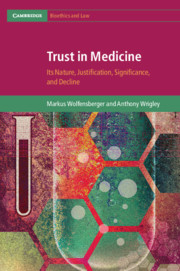Book contents
- Trust in Medicine
- Cambridge Bioethics and Law
- Trust in Medicine
- Copyright page
- Dedication
- Contents
- Figures
- Tables
- Preface
- Acknowledgements
- A Note on Usage
- Part I Introduction
- Part II The Nature of Trust
- Part III Justification of Trust
- Part IV Significance of Trust
- Part V The Decline of Trust
- Part VI Perspectives
- 13 Can We Restore Trust?
- References
- Index
- Series page
13 - Can We Restore Trust?
from Part VI - Perspectives
Published online by Cambridge University Press: 19 August 2019
- Trust in Medicine
- Cambridge Bioethics and Law
- Trust in Medicine
- Copyright page
- Dedication
- Contents
- Figures
- Tables
- Preface
- Acknowledgements
- A Note on Usage
- Part I Introduction
- Part II The Nature of Trust
- Part III Justification of Trust
- Part IV Significance of Trust
- Part V The Decline of Trust
- Part VI Perspectives
- 13 Can We Restore Trust?
- References
- Index
- Series page
Summary
As it is unlikely to ever be a return to the sort of status trust possessed by the medical profession in previous years, the most likely means of re-establishing trust between physicians and patients will be through advancing merit trust. The authors argue that individual physicians have the best chances of gaining their patients’ trust by (1) practising genuine shared decision-making which involves an honest two-way knowledge transfer, (2) inviting the patient to share responsibility, and (3) admitting uncertainty (whether personal or inherent in the available information). Although there is no guarantee that these will be sufficient to restore trust in all cases, from reflecting upon the nature of both trust as a concept and the causes of the decline of trust, these all seem to be extremely important considerations for any attempt to do so. Medical institutions of any type will most likely find it harder to gain trust. For them, it might be best to grant individual physicians the freedom and scope to advance their own trustworthiness in the eyes of patients, allowing those patients with the ‘suspended’ form of mistrust to perceive the attempt at establishing trustworthiness.
- Type
- Chapter
- Information
- Trust in MedicineIts Nature, Justification, Significance, and Decline, pp. 207 - 224Publisher: Cambridge University PressPrint publication year: 2019



